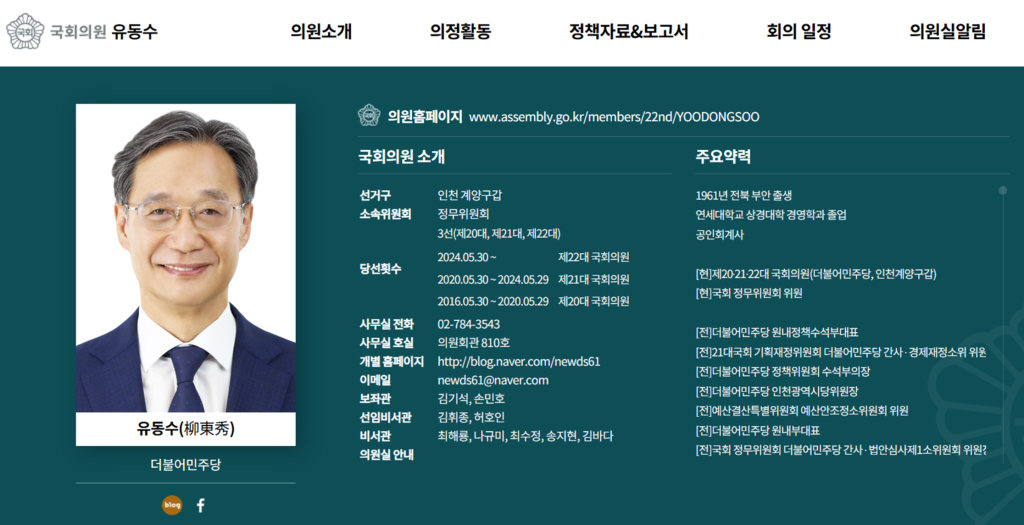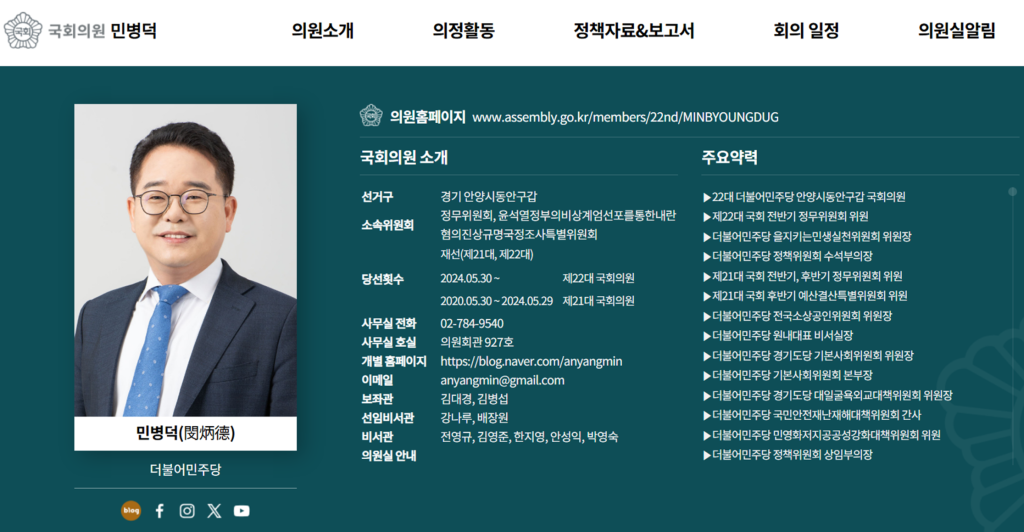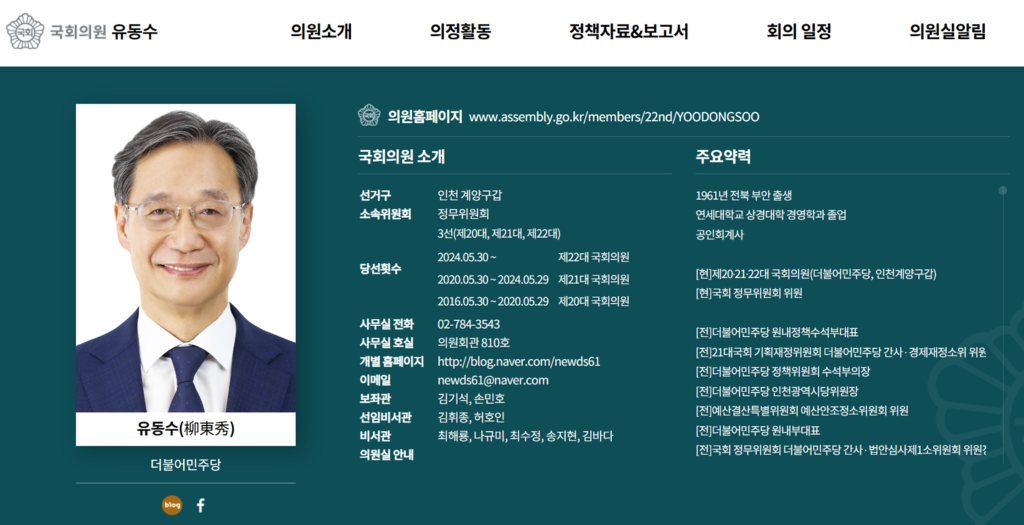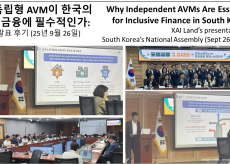레이, 자이랜드가 이 포럼에 참여했습니다: 그래서 뭐죠?


자이랜드는 지난 2월 7일(금) 대한민국 국회에서 개최된 ‘2025년 금융소비자보호포럼‘이라는 정책 포럼에 참석하는 영광을 누렸습니다. 이 포럼은 민병덕, 유동수 더불어민주당 의원실이 주최하고 금융과행복네트워크, 시니어금융교육협의회, 금융소비자네트워크가 주관한 행사였습니다.
이 포럼에서는 정부 및 규제 당국자, 금융 기관, 업계 전문가들이 모여 시급한 문제를 해결하기 위해 머리를 맞댔습니다: AI가 금융 사기를 예방할 수 있을까요?
AI가 중심 주제였지만, 포럼에서 자이랜드의 특별한 역할은 “정확하고 편향되지 않으며 투명한 부동산 가치 평가가 어떻게 전세사기를 예방할 수 있는지”를 논의하는 것이었습니다.
자이랜드의 이번 포럼 참여는 단순히 인사이트를 공유하는 데 그치지 않고 긍정적인 변화를 일으키기 위한 것이었습니다. 입법자, 정부 규제기관, 한국의 은행/금융기관 임원들과 함께 이 주제에 대해 논의하고 토론할 수 있었던 기회를 바탕으로 가까운 미래에 한국의 부동산 및 금융 분야에 두 가지 큰 변화가 일어날 것이라고 믿습니다.
1. 한국에도 AVM 표준 및 이해상충 규정이 필요합니다
미국에서는 AVM(자동가치사정모형)의 사용 방식을 규제하여 은행이 이해상충, 데이터 조작 등의 문제가 있는 평가 서비스에 의존하지 못하도록 하고 있습니다. 반면 한국에는 명확한 AVM 표준이 없어 많은 금융 기관이 편향적일 수 있는 평가 서비스에 의존하고 있습니다.
예를 들어
- KB국민은행이 운영하는 KB시세의 부동산 서비스는 지속적으로 부동산 가치를 과대평가해 금융기관의 모기지 및 대출 상품에 유리하게 작용할 수 있습니다 (1, 2, 3).
- 정부 기관인 한국부동산원은 자체 평가 시스템을 운영하고 있어 정치적 영향력 및 데이터 조작에 대한 우려가 제기되고 있습니다 (3, 4).
- 일부 AVM 제공업체는 주요 은행으로부터 투자를 받았지만, 같은 은행이 부분적으로 소유한 AVM 서비스를 이용하고 있어 명백한 이해 상충이 발생하고 있습니다.
한국 감정평가법의 허점으로 인해 이러한 종류의 감정평가 시스템과 서비스가 부동산 가격을 인위적으로 부풀려 임대료 상승, 주택담보대출 증가, 궁극적으로 소비자와 은행 모두의 금융 리스크를 증가시키는 결과를 초래했습니다.
해결책은? 한국도 미국과 유사한 독립적인 감정평가 표준을 수립하고 이해상충 규제를 시행해야 합니다. 금융기관은 편향되지 않은 제3자의 감정평가 모델을 사용해야 하며, 일반 대중이 은행의 감정평가 서비스가 얼마나 정확한지 알 수 있도록 정기적으로 평가 모델의 정확성을 공개해야 합니다.
이러한 규정이 제정되면 주택 구매자, 임차인, 투자자는 마침내 공정하고 투명한 부동산 평가에 접근할 수 있게 될 것입니다 (5).
2. 금융기관 및 공공기관의 새로운 AVM 도입 정책
현재 HUG(주택도시보증공사), HF(한국주택금융공사) 등 국내 주요 금융기관은 낙후된 내부 정책과 규정으로 인해 AVM을 전면적으로 활용하지 못하고 있는 실정입니다.
HUG는 AVM의 필요성을 인식하고 있지만, 현행법상 AVM 기반 가치평가를 공식적으로 인정하지 않고 있어 이 기술을 도입하지 못하고 있습니다. AVM이 제대로 도입되지 않으면 금융 소비자는 보호받지 못하고, 전세사기 행위는 계속 번성할 수밖에 없습니다.
의미 있는 변화를 위해서는 금융위원회, 국토교통부, 행정안전부가 협력하여 AVM이 부동산 가치 평가에서 공식적인 역할을 할 수 있도록 규정을 개정해야 합니다. 금융기관이 AVM을 보다 자유롭게 도입할 수 있게 되면 부실 대출로 인한 리스크를 줄이고 고평가된 부동산으로부터 소비자를 보호할 수 있습니다.
이러한 변화가 필요한 이유
저는 한국의 낙후된 부동산 감정평가 제도 하에서 전세사기가 어떻게 번성했는지 강조했습니다. 많은 피해자들이 위에서 언급한 감정평가 서비스나 감정평가사를 신뢰했다가 나중에야 감정평가 부풀리기로 알려진 기법을 사용해 집값이 인위적으로 심각하게 과대평가되었다는 사실을 알게 되었습니다. 또한 현재 한국의 감정평가 시장은 투명성이 결여되어 있어 소비자가 감정평가가 정확한지, 편향적인지 검증할 수 없다는 점도 폭로했습니다.
아래에서 제가 국회에서 발표한 프레젠테이션을 참고하시면 참석하신 모든 분들께 정확한 내용을 전달할 수 있습니다:
정책 입안자, 업계 리더, 대중의 반응은 분명했습니다. 변화가 필요하다는 것이었습니다. 제 발표에 대한 청중의 즉각적인 반응에서 알 수 있듯이 대중은 현재 감정평가 및 부동산 시세 시스템에 대한 신뢰를 잃었고 금융 리스크는 점점 커지고 있습니다:
AVM 규제와 도입을 추진함으로써 개인 임차인과 주택 구매자를 보호할 뿐만 아니라 국내 부동산 시장의 장기적인 안정성을 확보하고 있습니다.
최종 생각: 다음 단계
자이랜드는 한국의 부동산 가치평가를 공정하고 투명하며 데이터 기반으로 만들기 위해 최선을 다하고 있습니다. 정책 입안자, 금융기관, 업계 전문가들과 지속적으로 협력하여 이러한 개혁이 진전될 수 있도록 노력할 것입니다.
정책 입안자, 금융 기관 또는 업계 리더라면 이 운동에 동참해 주시기 바랍니다. 사람들이 신뢰할 수 있는 부동산 시장을 만들기 위해 함께 노력합시다.
한국에 거주하는 개인 시민으로서 전세사기 예방을 위한 위의 이니셔티브에 동참하고 싶으신 분은 이 포럼을 주최한 두 대표 중 한 명에게만 연락해 주세요 – (A) 민병덕 의원 & (B) 윤동수 의원:


여러분의 지지에 감사드리며, 이 중요한 대화를 계속 이어나갈 수 있기를 기대합니다.
자이랜드(주)에 대하여
자이랜드는 한국인이 어디에 있든 사기, 불공정 관행, 과다 청구의 위험 없이 완전한 투명성을 바탕으로 안심하고 부동산 금융과 거래를 할 수 있는 세상을 꿈꿉니다.
가장 정확한 AVM을 통해 부동산 거래를 지원하며, 정확한 가치 평가와 투명한 거래 프로세스를 보장하는 것이 우리의 사명입니다. 우리는 부동산 사기를 예방하고 공정한 가격을 보호하며, 국내외 모든 부동산 관련 과정에서 원활하고 안전한 경험을 제공하기 위해 끊임없이 노력하고 있습니다.
더 자세한 내용을 원한다면, https://xai.land/ 를 방문하거나 LinkedIn ( https://www.linkedin.com/company/18522292/ ) 또는 Facebook ( https://www.facebook.com/xailand/ )의 업데이트를 팔로우하십시오.
주요 요약은 Linktree(https://linktr.ee/xai_land)에서도 한눈에 확인하실 수 있습니다.
Ray, XAI Land Participated in this Forum: So What?
On Friday, February 7, 2025, XAI Land (자이랜드[주]) had the privilege of participating in a policy forum hosted at The National Assembly of The Republic of Korea called the “2025 Financial Consumer Protection Forum”. The forum was hosted by the offices of Representatives Min Byung-duk and Yoo Dong-soo, and organized by the Finance and Happiness Network, the Senior Financial Education Council, and the Financial Consumer Network.
The forum brought together government and regulatory officials, financial institutions, and industry experts to tackle a pressing issue: Can AI prevent financial fraud?
While AI was the central theme, XAI Land’s particular role in the forum was to discuss how “Accurate, unbiased, and transparent real estate valuations can prevent Jeonse fraud”.
XAI Land’s participation in this forum was not just about sharing our insights – it was about setting positive change in motion. I believe two major changes will happen in South Korea’s real estate and financial sectors in the near future based on the discussions and opportunity we had to discuss this topic with law makers, government regulators, and executives from South Korea’s banking/financial institutions.
1. South Korea needs AVM Standards and Conflict of Interest Regulations
In the United States, regulations govern how AVMs (Automated Valuation Models) are used, preventing banks from relying on valuation services that could have conflicts of interest, data manipulation, among others. In contrast, South Korea has no clear AVM standards, and many financial institutions rely on valuation services that could be biased in their favor.
For example:
- KB Kookmin Bank’s Real Estate Service, run by KB Bank, has consistently overestimated property values, which may benefit financial institutions’ mortgage and lending products (1, 2, 3).
- Korea Real Estate Board, a government agency, operates its own valuation system, raising concerns about political influence and data manipulation (3, 4).
- Certain AVM (Automated Valuation Model) providers have received investment from major banks, yet those same banks use the AVM services they partially own – creating a clear conflict of interest.
Loopholes in South Korea’s appraisal laws have allowed these kinds of valuation systems and services to artificially inflate real estate prices, leading to higher rent, inflated mortgages, and ultimately, higher financial risks for consumers and banks alike.
The solution? South Korea must establish independent AVM standards and implement conflict of interest regulations similar to those in the U.S. Financial institutions should be required to use third-party, unbiased AVM models and publicly disclose the accuracy of their valuation models on a regular basis so the public at large may understand how accurate their bank’s valuation services really are.
If these regulations are enacted, homebuyers, renters, and investors will finally have access to fair and transparent property valuations (5).
2. New AVM Adoption Policies for Financial Institutions and Public Agencies
Currently, major financial institutions in Korea, including HUG (Housing & Urban Guarantee Corporation), HF (Korea Housing Finance Corporation), among others, are restricted from fully using AVMs due to outdated internal policies and regulations.
Even though HUG recognizes the need for AVMs, current laws do not formally acknowledge AVM-based valuation, preventing them from integrating this technology. Without proper AVM adoption, financial consumers lack protection, and fraudulent activities like Jeonse scams continue to thrive.
For meaningful change, Korea’s Financial Services Commission, Ministry of Land, Infrastructure and Transport, and Ministry of the Interior and Safety must work together to update regulations, allowing AVMs to play a formal role in real estate valuation. Once financial institutions can adopt AVMs more freely, they can reduce risks from bad loans and protect consumers from overvalued properties.
Why These Changes Will Happen
I highlighted how Jeonse fraud has thrived under Korea’s outdated real estate appraisal system. Many victims either trusted one of the valuation services mentioned above or appraisers, only to find out later that their homes were severely artificially over-valued using a technique known as appraisal inflation. I also exposed how Korea’s current appraisal market lacks transparency, making it impossible for consumers to verify whether valuations are accurate or biased.
You may refer to my presentation I shared at the National Assembly below as it contains the exact storyline we presented to everyone in attendance:
The response from policymakers, industry leaders, and the public was clear: change is necessary. The public has lost trust in the current appraisal system and the financial risks are growing, as evidenced in the audience’s immediate reaction to our presentation:
By pushing for AVM regulations and adoption, we are not only protecting individual renters and homebuyers but also ensuring the long-term stability of Korea’s real estate market.
Final Thoughts: The Next Steps
XAI Land is committed to making real estate valuation in Korea fair, transparent, and data-driven. We will continue engaging with policymakers, financial institutions, and industry experts to ensure these reforms move forward.
If you are a policymaker, financial institution, or industry leader, I urge you to join this movement. Let’s work together to build a real estate market that people can trust.
If you are private citizen living in South Korea who may wish to be support our initiatives above to prevent Jeonse fraud then please contact one if not both of the representatives who hosted this forum – (A) Min Byung-duk and (B) Yoo Dong-soo:


Thank you for your support, and I look forward to continuing this important conversation.
About XAI Land
XAI Land envisions a world where Koreans, no matter where they may call home, can confidently finance and transact real estate with complete transparency, free from the risks of fraud, unfair practices, or being ripped off.
Our mission is to support real estate transactions with the most accurate automated valuation models (AVMs), ensuring accurate valuations and transparent transaction processes. We are constantly striving to prevent real estate fraud, protect fair prices, and provide a seamless and secure experience in all real estate-related processes, both domestically and internationally.
For more information, visit https://xai.land/ or follow updates on LinkedIn (https://www.linkedin.com/company/18522292/) or Facebook (https://www.facebook.com/xailand/).
You can also see the main summary at a glance on Linktree (https://linktr.ee/xai_land).
Photos / 사진
- 조수진 (ji_ny06_): https://www.instagram.com/ji_ny06_/
Sources Cited / 출처
(1) KB 부동산 시세, 실제보다 높다?: https://www.ajunews.com/view/20191014114215198?fbclid=IwAR08-g2_eBJdyxkFMs_koah6ngQ6mqk7DQLwyFPA4gUWfSn_VIlr7mLglKY
(2) 자이랜드 AVM, K*시세·질로우 제쳤다… 정확도 2배 이상 높아: https://bit.ly/자이랜드_AVM_Kㅇ시세_질로우_제쳤다_정확도2배_이상_높아_Blog
(3) 부동산원도 KB도 다 틀렸다…한계 드러낸 집값 ‘주간조사’: https://www.khan.co.kr/article/202310092144005
(4) 한국부동산원 국감서 통계조작 등 지적: https://news.kbs.co.kr/news/pc/view/view.do?ncd=8083160
(5) 누가 내 집값을 조정하고 있을까요? 한국 부동산 가격 산정의 숨겨진 갈등: https://xai.land/ko/%EB%88%84%EA%B0%80-%EB%82%B4-%EC%A7%91%EA%B0%92%EC%9D%84-%EC%A1%B0%EC%A0%95%ED%95%98%EA%B3%A0-%EC%9E%88%EC%9D%84%EA%B9%8C%EC%9A%94-%ED%95%9C%EA%B5%AD-%EB%B6%80%EB%8F%99%EC%82%B0-%EA%B0%80%EA%B2%A9/



